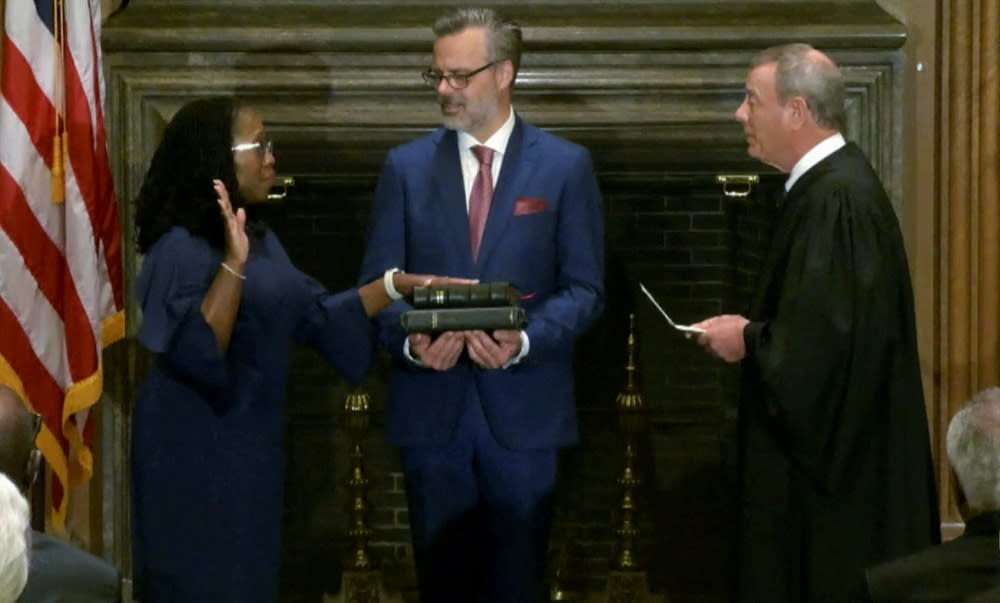Ketanji Brown Jackson sworn in as first Black female Supreme Court justice
Ketanji Brown Jackson was sworn in on Thursday as the newest Supreme Court justice — becoming the first Black woman ever to serve on the high court.
Jackson, 51, took the constitutional oath from Chief Justice John Roberts and judicial oath from 83-year-old Justice Stephen Breyer, whose retirement became official just minutes before the swearing-in ceremony.
Her husband, Dr. Patrick Jackson, held the Bible as the oaths were administered.
Breyer informed President Biden on Wednesday that his retirement would take effect Thursday at noon ET after the court issued its last two opinions before taking a summer recess. The court’s next term begins on Oct. 3.
Jackson’s addition to the bench will not change the ideological alignment of the court, which remains 6-3 in favor of conservatives appointed by Republican presidents.
She joins as the Supreme Court reaches a record low in public confidence after a number of unpopular decisions,including the stripping of reproductive rights from millions of Americans.

Biden selected Jackson to fill Breyer’s seat in February, and she was confirmed by the Senate in April with the support of all 50 members of the Democratic caucus and three Republicans.
She becomes the 116th justice and first federal public defender in the court’s history, fulfilling Biden’s campaign promise of appointing a Black woman to the Supreme Court.
Biden had previously nominated Jackson to the U.S. Court of Appeals for the District of Columbia last summer. Prior to that, she had served as a judge in the U.S. District Court for the District of Columbia since 2013 as well as the vice chair of the U.S. Sentencing Commission. After growing up in South Florida, Jackson attended Harvard for both undergrad and law school.
Jackson is the third Black person to serve on the court, following Thurgood Marshall and Clarence Thomas, now the court’s oldest member after Breyer’s retirement. She is the sixth woman to serve, and this is the first time four women have served together, with Jackson joining Sonia Sotomayor, Elena Kagan and Amy Coney Barrett on the current bench.

During her March confirmation hearings in front of the Senate Judiciary Committee, Jackson discussed what her being in that position meant, saying, "My parents taught me that unlike the many barriers that they had to face growing up, my path was clearer, so that if I worked hard and believed in myself, in America I could do anything or be anything I wanted to be.
“When I was born here in Washington, my parents were public school teachers, and to express both pride in their heritage and hope for the future, they gave me an African name: Ketanji Onyika, which they were told means ‘lovely one,’” she continued.
Jackson was supported at the hearings by her husband and two daughters, to whom she said, “Girls, I know it has not been easy as I’ve tried to navigate the challenges of juggling my career and motherhood. I fully admit I did not always get the balance right, but I hope that you’ve seen with hard work, determination and love, it can be done.”
